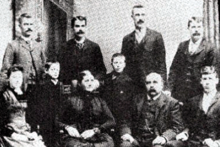Jiggs Parrott
[1] Thomas H. Parrott was born in England but moved outside of Sherwood, Oregon in 1857 which used to be a part of Yamhill County .
[1] Although he was training to be a shoemaker in England, when Thomas H. Parrott moved to Portland, he opened a music business.
[1] Eventually, Parrott and his brothers, Dode and Tom, signed with the East Portland Willamettes, an amateur baseball team.
[1] In 1890, Parrott began his professional baseball career with the Portland Webfeet of the Pacific Northwest League.
[7] During the 1892 season, Cap Anson, the manager of the Chicago Colts, offered Parrott a Major League Baseball (MLB) contract to play with his club.
He finished the season third in fielding percentage amongst National League third basemen (.891), behind Billy Nash and George Davis.
'"[1] However, in June, The Sporting Life changed its tune and called Parrott's work at third base a "little less than brilliant".
[1] It was reported that Anson was impressed by Parrott as a person, calling him a "well-behaved young man" despite some criticism he was getting from the media and fans.
[1] The Washington Post reported that Tom Parrott bought out his contract with his former team so he could play with his brother in Chicago.
His fielding percentage at third base was the fifth highest in the National League (.904), behind Jack Crooks, Denny Lyons, George Pinkney and Billy Nash.
In 1895, Anson signed a new second baseman, Ace Stewart from Sioux City, Iowa, which demoted Parrott to the role of utility player.
[1] Anson responded to the criticism he had been taking for keeping Parrott by stating, "I realize that 'Jiggs' is not popular with the Chicago crowds, so we will play him in games abroad only.
"[1] However, The Sporting Life responded by saying, "The local scribes and fans thought we had buried the lanky 'Jigglets,' so far as Chicago was concerned, but he bobs up serenely.
[1] After being released by the MLB Chicago Colts, Parrott returned to the minor leagues with the Class-B Rockford Forest Citys/Reds of the Western Association.
[1] As a member of the Columbus club, The Milwaukee Journal noted in September that Parrott had "been playing a great fielding game".
[18] His pall-bearers were several former teammates from the Portland Willamettes: Joseph Beveridge, Charles Neale, Frank Buchtel, William Kern, Fred Bailey, and John Rankin.
